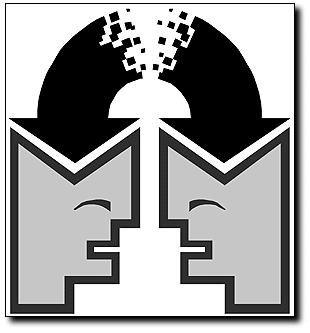![]()
![[ OPINIONS ]](/images/fall97/opinionsf97.gif)
![]()
By Ezekiel Buchheit
Arizona Daily Wildcat February 9, 1998
The freedom to speak and manipulate readers' minds
![[Picture]](04_3_i.gif)
Ezekiel Buchheit |
It has occurred to me that most people reading these columns are being manipulated
and twisted. They're forced to read into a work what the author wants them
to hear. So I have decided, because I love all of you so much, to give you,
in essence, reading guidelines, so you can look through the beautiful flowery
writing to see the pile of crap it is growing on.
First, remember, English is a very difficult and powerful language. There are so many words with similar meanings and denotations and connotations that a simple change in usage can add an entire other meaning and emotion to a phrase. Take the classic example of the difference between "house" and "home." The words' definitions are obviously different, but they each have separate connotations. This, I guess, makes them entirely different words, that makes the entire example dead and useless from the beginning. But I'll go with it anyway. Here are some example sentences, one using "home" and one using "house" (why I felt I should tell that one would use another word I don't know. Just bear with me.):
1. "The bum who asks you for money lives in a home consisting of cardboard boxes."
2. "The bum asking you for money lives in a house somewhere in the upper hills of Malibu and has found that begging can be a very lucrative occupation."
So we see that a simple difference in related words can change the meaning and feeling of a piece, without us ever consciously realizing it.
Words also in themselves have separate powers. Take, for instance, the word "anyway." This is my personal favorite word, because it allows me to go off on any irrelevant tangent and come back to the main point without skipping a beat. For example, if I were to now discuss Primus' new album, The Brown Album, many Primus fans would instantly recognize this album being the one which changed from Primus' long time drummer Tim "Herb" Alexander to their original drummer, Brian "Brain" Mantia, who had broken his ankle prior to the recording of their first album. At first I was wary of the change, but I have found that Brain's addition to the group adds a more collective atmosphere; they seem to have bonded more closely, which allows for tighter and more inspired grooves in the band's music. Anyway, to get back to the point, words such as this allow writers to string you along, without your awareness, until such a time as they have you reading and over-reading those things that they want you to. Or maybe not. Perhaps this is all a sham and I'm over-analyzing a dead concept. Confused yet?

Characters. Characters are a writer's best friends. For instance, I could say my friend Steve thinks that frats suck. He hates frats. In fact, he believes that the basic collective frat motto should be "Join a frat, buy a friend." Sure, Steve goes to all the frat parties, drinks their beer and stumbles home, but this doesn't make Steve a hypocrite. Why? Because Steve doesn't exist. He's a character. Steve is a clever way for a writer to say anything they want to without having to take any blame for it. I could have Steve say "You know, I think the President has slept with more than just women. He has also probably slept with goats," it doesn't matter. Steve gets into trouble, not me.
Which brings me to my final point: "I think." "I think" is the most powerful and versatile of all tools. As long as the words "I think" are placed somewhere in a sentence, a writer can say any damned thing without ever getting in trouble. I could say "I think my editor, M. Stephanie Murray, has mob connections and uses this newspaper as a front for her drug cartel." She can't change it because it's just an opinion. Gosh, all the fun that could be had with this amazing concept.
The danger comes to the reader when the writer enlists these concepts in manipulating your mind. They could get you to be sympathetic to ideas and concepts that you are, and have always been, adamantly against. So be careful and conscious of the words you are reading. Anyway, I should probably stop writing now. The abuse I think my parents put me through as a young child has sent me into a deep depression. It's time I turn back to the drug abuse I use as a crutch and dream that maybe someday I will find people who truly love me for the person I am inside, and not this poor ragged fool living in a home of twigs and spit.
Ezekiel Buchheit is a freshman majoring in English. His column, "I Like Biscuts," appears every Monday.



